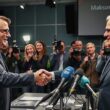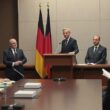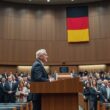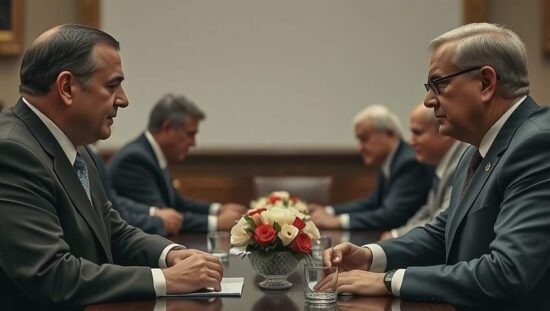A transatlantic and European leadership coalition, spearheaded by German Chancellor Friedrich Merz, French President Emmanuel Macron and UK Prime Minister Keir Starmer, convened virtually Friday to reaffirm unwavering support for Ukraine and coordinate strategies regarding the ongoing conflict. The call, involving Ukrainian President Volodymyr Zelenskyy, underscored a concerted effort to navigate the complexities of potential peace negotiations while maintaining a unified front against further Russian aggression.
While the joint statement, released by German government spokesman Stefan Kornelius, highlighted the leaders’ “welcome” of US efforts to broker a resolution, the subtle nuances of the language betray a degree of caution and potential divergence in strategic outlook. The explicit acknowledgement of US initiatives suggests a tacit recognition of a shifting dynamic, with Washington’s influence potentially eclipsing traditional European leadership roles in the crisis. The phrasing “welcome” rather than a stronger endorsement, hints at a degree of scrutiny regarding the specific terms and conditions envisioned by Washington.
The commitment to preserving Ukraine’s ability to “effectively” defend its sovereignty, alongside the affirmation that the contact line should serve as the foundation for negotiations, represents a precarious balancing act. It reflects a desire to avoid ceding territory while simultaneously acknowledging the reality that a complete Russian withdrawal is unlikely in the short term. This compromise could be interpreted by some as an implicit endorsement of a negotiated settlement that falls short of Ukraine’s maximalist goals, potentially fueling domestic political tensions in Kyiv.
Critically, the emphasis on requiring the consent of European partners and the consensus of NATO allies for any agreement impacting these entities reveals a potential obstacle to rapid progress. Such a stipulation effectively embeds a layer of political hurdle, reflecting anxieties within European capitals regarding security guarantees and the long-term implications of any potential settlement. Internal disagreements amongst allies, particularly concerning the nature of post-conflict security arrangements for Ukraine, remain a significant challenge. The need for unanimous agreement will likely prolong the negotiation process and could limit the scope of potential compromises.
The call’s underlying message, while reinforcing solidarity with Ukraine, subtly highlights the ongoing jostling for influence and strategic alignment among key international players, emphasizing the intricate and politically fraught nature of the path towards a durable peace.





